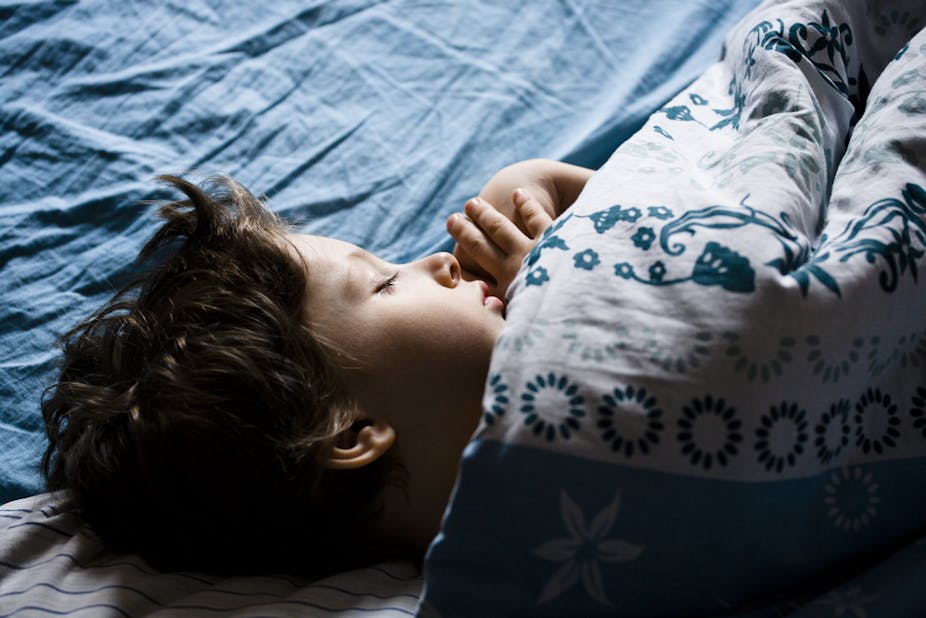We’ve long known that children need a certain amount of sleep: nine to 11 hours per night for older kids, and up to 14 hours in 24 for toddlers. There’s no doubt that getting enough sleep is paramount to a child’s healthy development, but recent research has shown that a regular routine – going to bed the same time every night and waking the same time every morning – is just as important to a child’s daytime functioning.
An Australian study of almost 2,000 school-aged children recently showed that, when compared to a child with the same bedtime (less than a 30 minutes difference across the week), a child with a 60-minute difference was twice as likely to display hyperactive behaviours and have problems controlling their emotions.
Children who had a two-hour difference in bedtime across the week were six times as likely to display hyperactive behaviours. This association was seen even when the children were getting the recommended amount of ten hours of sleep per night.
Irregular bedtime schedules have a similar impact in teenagers, with an older study in adolescents reporting that inconsistent sleep schedules were associated with increased anxiety and depression, again, regardless of the total amount of sleep obtained.

So, are the irregular routines driving the poor behaviour or are the behavioural problems resulting in poor routines?
A recent study of more than 10,000 children in the UK suggests the former. The researchers found that if a child went from having a regular bedtime schedule when a toddler (three years) to an irregular schedule when they started school (five years), their behaviour worsened over time. This study also showed that behaviour problems improved if the child went from an irregular schedule to a regular one.
If your child or teen is getting the right amount of sleep, why should it matter that they go to bed at different times?
The answer lies in the way sleep is regulated within the body. The need for sleep is a biological process and is regulated, in part, by a circadian rhythm which stems from the brain. The circadian rhythm is the body’s internal clock and regulates sleep and wake by producing hormones at certain times of the day, based on the cycle of light and dark, to trigger alertness or tiredness.
Most people are familiar with, and may have even experienced, jetlag. When we move quickly from one time zone to another, the circadian rhythm falls out of sync with the environmental clock or activities. This leaves us with feelings of extreme tiredness, fuzzy headedness, poor concentration, irritability and even nausea.
These same feelings can arise when the circadian is forced out of sync by our everyday activities, such as when bedtimes change night to night, or even when bed and wake times shift later on weekends. This phenomenon is termed social jetlag.
Social jetlag is often most obvious in teenagers. During puberty, the circadian rhythm shifts so that the biological cues for sleep and wake occur later than at other stages of the life cycle. This results in teenagers not wanting to go to sleep until late into the night and wanting to sleep through to late morning, early afternoon. The use of electronic devices at night will intensify this shift.

As a result of study, family and work or sporting commitments, many teenagers have highly irregular schedules and chronic sleep deprivation. This leaves them experiencing all the physical and mental consequences of flying across to the other side of the world.
Research shows social jetlag can affect younger children too. The problem is that, unlike jetlag which resolves after the circadian system adjusts to the new time zone, social jetlag can be ongoing.
The good news is that social jetlag is relatively easy to fix. Here are some simple tips that will help your child or teenager maintain a regular sleep routine:
- Set a regular, non-negotiable, bedtime each night
- Turn off all electronic devices at least 30 minutes to an hour before the child’s bedtime
- Have a sleep preparation routine (for example, get pyjamas on, brush teeth, read a story, and so on)
- Don’t allow your child to have any caffeinated foods or beverages at least three to four hours before bedtime
- Keep light levels low in the bedroom.
Setting up a new sleep routine for your child can be tough and may take some time to become a habit, much like starting a new exercise program. However, healthy sleep practices are not only about getting enough and making the effort to establish a regular sleep routine will be well worth it for both you and your child.

